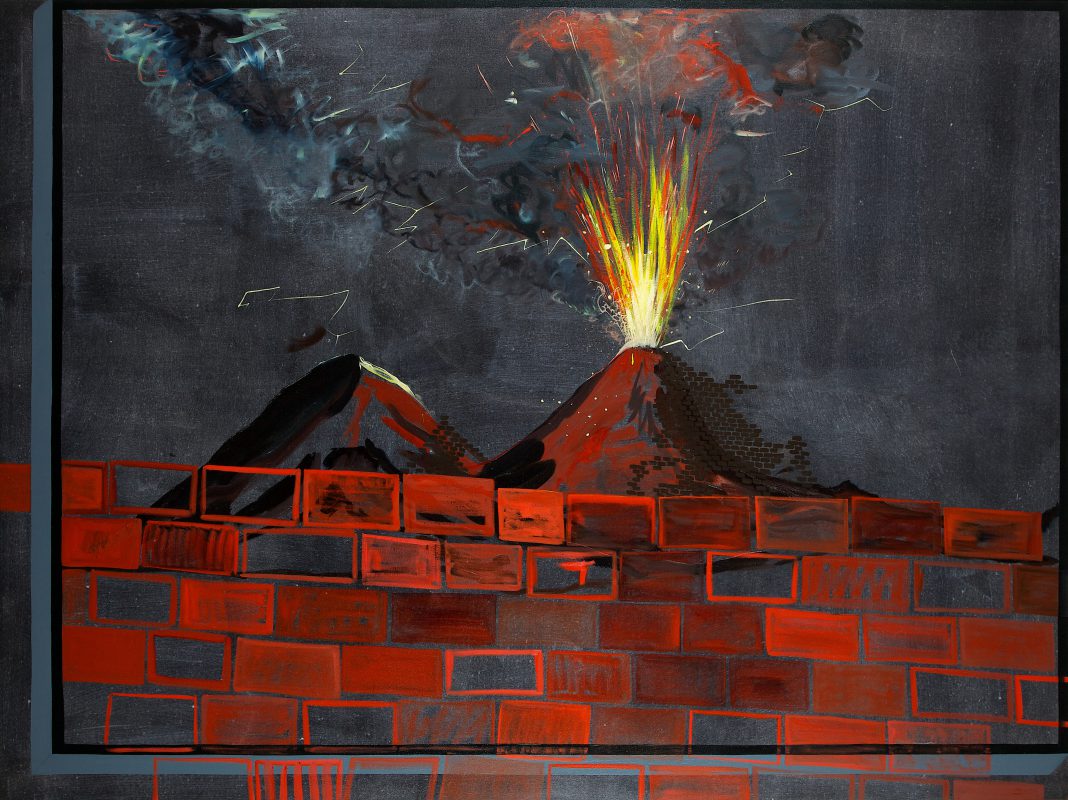This autumn, Hastings Contemporary will present a major survey show of the work of Caragh Thuring, her first UK exhibition in six years.
The show of more than 20 works will include paintings, drawings and monotypes created over the last 15 years. All works are on loan from the artist and public and private UK collections, in order to avoid the environmental impact of international shipping.
Thuring’s unique compositions oscillate between the humorous and the quotidian, juxtaposing signs and imagery from her recurring iconography of volcanoes, bricks, submarines, tartan, human silhouettes, and flora, and exploring where natural and manufactured worlds collide.
Thuring grew up in Scotland near to the Holy Loch, the site of the renowned cold war US nuclear submarine base and also the construction site for the first concrete North Sea oil rigs. This clash of nature and industry has endured throughout her practice with looming submarine silhouettes, vast industrial structures and landscapes frequently appearing across different series. Similarly, Thuring incorporates a recurrent brick motif in her work, which for her perfectly represents the natural and the manufactured in a single object.
Thuring is curious about what lies out of sight. Volcanoes and submarines lurk beneath, intermittently breaking through to the surface. Brick walls obstruct our view and untreated or woven canvas draw our attention to the surface of the painting itself and what might lie beyond. What is not obscured is often fragmented, disrupting the viewer’s familiarity of what they are looking at.
For recent works, Thuring has commissioned bespoke cloth from silk weavers in Suffolk to use as her canvas. Digital renderings of previous paintings, photographs she has taken, or found images are woven on a loom, sewn together, and stretched before being painted onto. As she describes it: “I want to build the work into the surface, to continue the work I’ve already begun.”
Thuring’s fascination with boundary lines and liminal spaces is perfectly reflected in the gallery’s own position on the foreshore, surrounded by the town’s historic beach, net huts and working structures of the fishing fleet. Massacre of the Innocents (after Breughel), 2010, seems to echo the local towering architecture of the fishermen’s huts on Hastings beach, while the language of maritime and landscape permeate throughout the work.
Thuring says she is looking forward to the unprecedented experience of seeing her works created at different points through her career, together for the first time.
Hastings Contemporary director Liz Gilmore says “Hastings Contemporary aims to champion the very best in contemporary art, particularly painting; so the work of the important mid-career artist Caragh Thuring is a perfect fit for our 10th anniversary year. Thuring’s work is fluid, intuitive, instinctual. The consistency of her output is extraordinary. Thuring has explored and returned to many motifs over the years, often in response to the geography/location and nature (including human nature). From volcanoes and their geological structures, nuclear submarines and landscapes, the clash of the natural and the manufactured. An exhibition of this nature, in our eco seafront gallery, consuming all our ground floor galleries will have dramatic impact yet also a strong resonance in Hastings and indeed nationally.”
Image Credits: Courtesy the artist and Thomas Dane Gallery. Photo: Richard Ivey .



